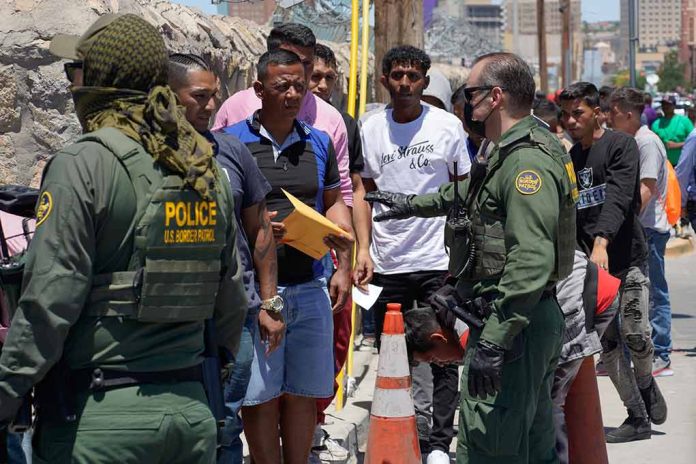
President Trump unveils a controversial plan to pay undocumented immigrants to self-deport, promising a pathway for “good” migrants to return legally while removing criminal elements from the country.
Key Takeaways
- Trump’s proposal includes offering money and plane tickets to undocumented immigrants who voluntarily leave the U.S.
- The plan prioritizes deporting criminals while creating pathways for workers needed in agriculture and hospitality to return legally.
- Nearly one million migrants have been warned to self-deport immediately or potentially face permanent reentry bans.
- The Department of Homeland Security has updated the CBP One app to facilitate the self-deportation process.
- The initiative comes amid criticism of recent deportations to El Salvador and lacks specific implementation details or timeline.
A New Approach to Immigration Enforcement
In a significant shift in immigration strategy, President Donald Trump has proposed a self-deportation program that would offer financial incentives to undocumented immigrants who voluntarily leave the United States. The plan, outlined during a recent interview, would provide departing migrants with a stipend and airfare to return to their home countries. This approach aims to address the ongoing border crisis while distinguishing between migrants deemed criminal threats and those who could contribute positively to the American economy if they entered through legal channels.
The program represents a departure from conventional deportation methods, focusing on creating incentives for voluntary compliance rather than solely relying on enforcement operations. According to administration sources, those who participate in the self-deportation program might receive priority consideration for legal reentry, particularly if they possess skills needed in industries experiencing labor shortages. The Department of Homeland Security has already updated the CBP One app to accommodate those wishing to announce their intention to self-deport.
U.S. President Donald Trump said in an interview aired on Tuesday that he planned to roll out a new program offering money for immigrants in the country illegally to leave voluntarily. https://t.co/6C50LBCSLi pic.twitter.com/WpWviPT5pb
— Reuters (@Reuters) April 16, 2025
Targeting Criminals While Supporting Economic Needs
Trump’s administration has made it clear that the deportation efforts will focus primarily on individuals with criminal records or gang affiliations. “We’re going to give them a stipend. We’re going to give them some money and a plane ticket, and then we’re going to work with them – if they’re good – if we want them back in, we’re going to work with them to get them back in as quickly as we can,” Trump explained during the interview.
The President specifically highlighted the agricultural and hospitality sectors as industries that rely heavily on immigrant labor. He suggested implementing a system where employers could recommend workers for legal immigration status after they’ve self-deported. This component of the plan addresses economic concerns raised by business leaders who have warned about workforce shortages in key industries if mass deportations occur without consideration for labor market needs.
Implementation Challenges and Warnings
While the concept has garnered support from those seeking solutions to the immigration crisis, the proposal lacks specific details regarding funding, eligibility criteria, and timeline for implementation. Immigration policy experts have questioned the logistics of processing large numbers of legal reentry applications in a timely manner, particularly given current backlogs in the immigration system. Additionally, nearly one million migrants have reportedly received formal termination notices warning them to self-deport immediately or face potential permanent reentry bans.
The announcement comes at a time when the administration faces scrutiny over recent deportations to El Salvador, where some migrants have reportedly been sent to prisons. Critics argue that this contradicts the “comfortable” self-deportation process Trump described in his interview. However, administration officials maintain that these deportations specifically targeted individuals with known criminal backgrounds or gang affiliations, consistent with the President’s stated focus on removing dangerous elements from American communities.
The Path Forward
For undocumented immigrants currently in the country, the proposal creates both opportunity and uncertainty. Those who utilize the CBP One app to self-deport would reportedly have better chances of returning legally than those who wait for enforcement actions. The administration has emphasized that compliance with the self-deportation program would be viewed favorably in future immigration proceedings, creating an incentive structure designed to encourage voluntary participation rather than resistance to enforcement efforts.
As the plan moves toward potential implementation, agricultural and hospitality industry leaders are closely monitoring developments, particularly regarding the promised mechanisms for bringing needed workers back through legal channels. The success of the program will likely depend on the administration’s ability to create efficient processes for legal reentry that align with economic needs while satisfying security concerns that have been central to Trump’s immigration platform since his first presidential campaign.
Sources:
Trump offers illegal migrants money and airplane ticket to self-deport to fix border crisis



